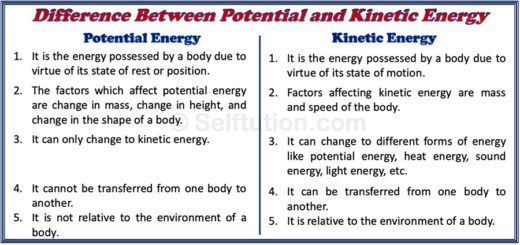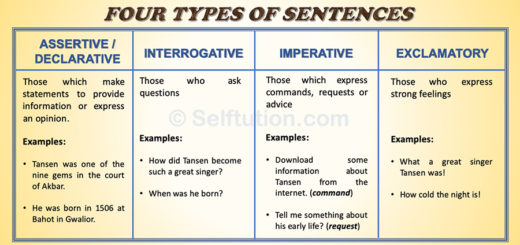Six (6) Organs or Bodies of United Nations
The United Nations comprises six (6) main organs or bodies along with fifteen (15) agencies to carry out its work.
The United Nations (UN) is an international organization whose main objective is to maintain peace in the world.
The UN was formed in 1945 after the Second World War to stop wars between countries. Today, 193 nations are members of the United Nations.
The six (6) main organs or bodies of the United Nations that carry out the work of the UN are:
- General Assembly,
- Security Council,
- The Economic and Social Council,
- Secretariat,
- Trusteeship Council,
- International Court of Justice.
Six Main Organs of the United Nations
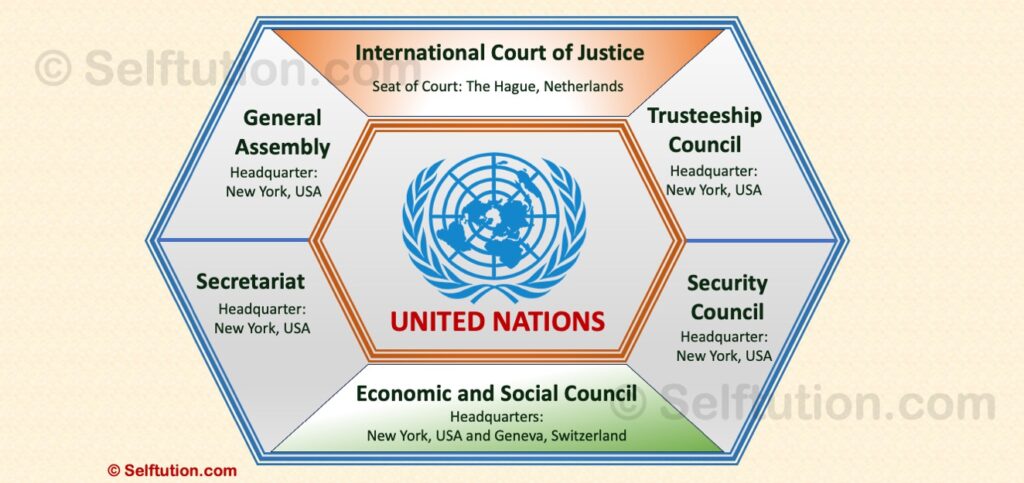
Six (6) main organs or bodies of the United Nations (UN) along with their headquarters
General Assembly
Among all other organs of the United Nations (UN), the General Assembly is the most important organ of the United Nations (UN). The main objective of this organ of the United Nations is policymaking for the working of the UN. It constitutes the representatives of all 193 Member States of the UN, therefore making it the only United Nations organ with universal representation. Therefore, we also call it the Parliament of the World. Each member nation has one vote. They meet once a year to discuss important international issues. Decisions on important questions, such as those on peace and security, admission of new members, and budgetary matters, require a two-thirds majority of the General Assembly. It is mandatory to take the views and opinions of each member nation, before taking any decision. The headquarters of the General Assembly is in New York, USA.
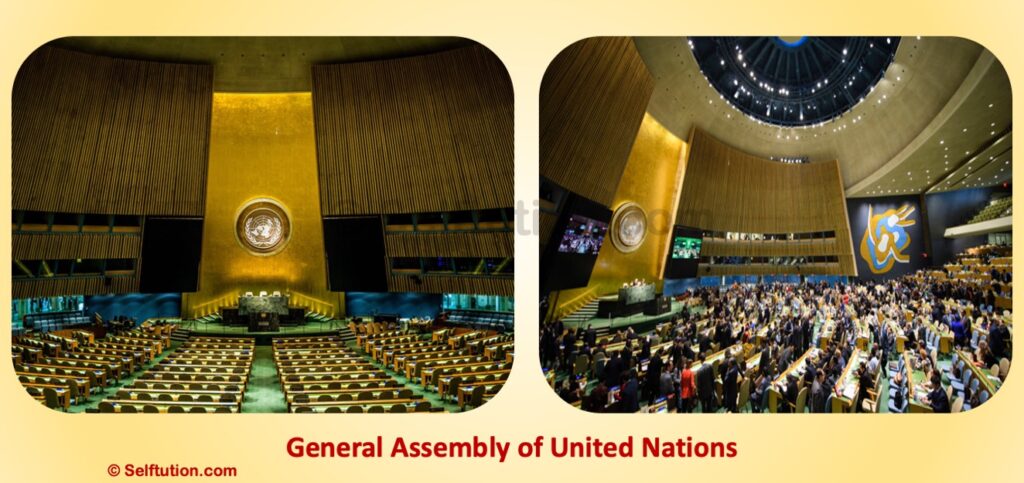
A view of the General Assembly of the United Nations
Security Council
The Security Council is the most important and the most powerful organ of the United Nations (UN). The main objective of the Security Council is to maintain international peace and security. It has fifteen members (five permanent members and ten non-permanent members). The five permanent members of the United Nations are the USA, the UK, Russia, France, and China. The General Assembly elects other ten non-permanent members for two years. The permanent members have the power to veto, i.e. to vote against the matter being discussed.
The power to veto is the most important power attributed to the permanent members. To understand its importance, consider this scenario. In the United Nations Security Council, decisions are made by a majority of 9 votes of the 15 votes. However, even if one of the five permanent members of the Security Council makes use of its veto, the division will be put to abience.
The Security Council determines whether a threat to peace or an act of aggression exists. It calls upon the parties in a dispute to settle it by peaceful means and recommends methods of adjustment or terms of settlement. In some cases, the Security Council can resort to imposing sanctions or even authorizing the use of force to maintain or restore international peace and security.
Back to the six organs of the United Nations
Economic and Social Council
The Economic and Social Council, established in 1945, looks after the programs of the United Nations related to health, education, social upliftment, culture, etc. The main objectives of this organ or body of the United Nations are policy review, policy dialogue, and recommendations on economic, social, and environmental issues, as well as the implementation of internationally agreed development goals. Various agencies of the council help the poor, sick, and illiterate people all over the world to improve their standard of living. It has 54 Members, elected by the General Assembly for overlapping three-year terms. Its headquarters are in New York, USA & Geneva, Switzerland.
Secretariat
The Secretariat handles all the administrative work of the UN. It carries out the daily work of the UN. The Secretary-General is the head of the Secretariat and the most powerful official of the UN. The General Assembly appoints the Secretary-General for five years. The first secretary general was Trygvie Lie. The office of the Secretary General of the United Nations comprises tens of thousands of international UN staff members. They carry out the day-to-day work of the United Nations as mandated by the General Assembly and the Organization’s other principal bodies or organs.
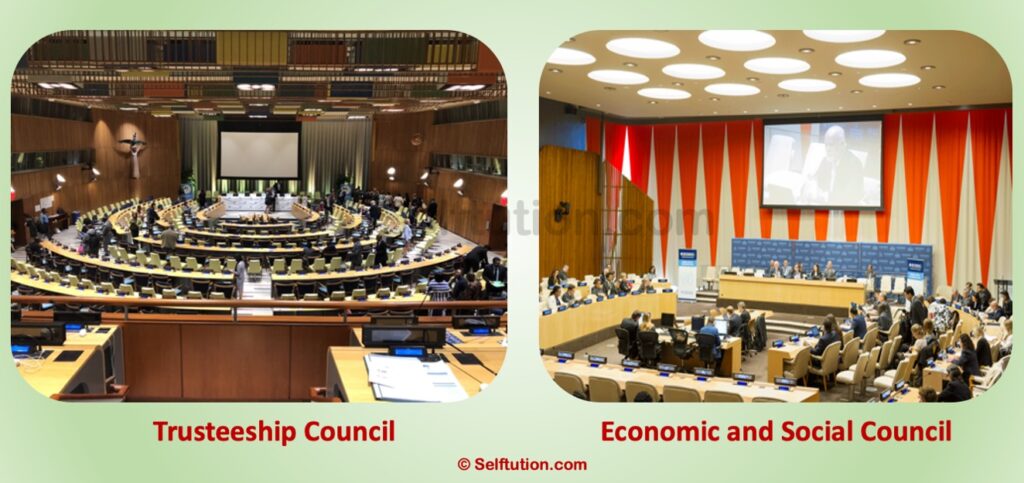
Two major organs of the United Nations – the Trusteeship Council and the Economic and Social Council
Trusteeship Council
The United Nations Trusteeship Council is one of the six principal organs of the United Nations, established in 1945. The main objective of this organ of the United Nations is to ensure that trust territories are administered in the best interests of their inhabitants and of international peace and security. The trust territories—most of them former mandates of the League of Nations or territories taken from nations defeated at the end of World War II—have all now attained self-government or independence, either as separate nations or by joining neighboring independent countries. The last was Palau, formerly part of the Trust Territory of the Pacific Islands, which became a member state of the United Nations in December 1994.
International Court of Justice
The International Court of Justice, established in 1945, is the chief court of the UN. The main objective of this organ of the United Nations is to settle all legal disputes between the member nations peacefully. The court has fifteen judges elected for a term of nine years. The seat of the Court is at the Peace Palace in The Hague, Netherlands. It is the only one of the six principal organs of the United Nations not located in New York (United States of America). The Court’s role is to settle, by international law, legal disputes submitted to it by States. The court also gives advisory opinions on legal questions referred to it by authorized United Nations organs and specialized agencies.
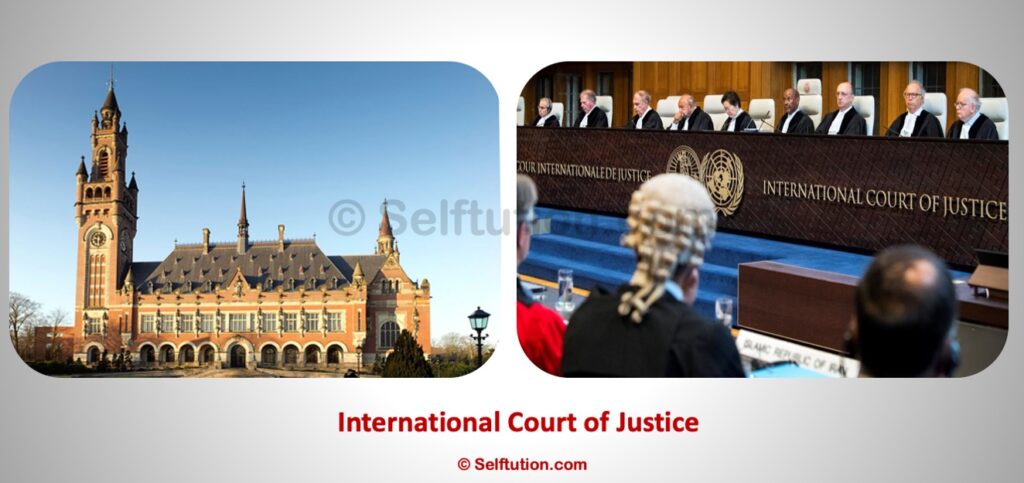
International Court of Justice






